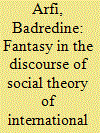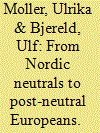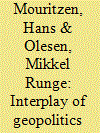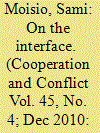|
|
|
Sort Order |
|
|
|
Items / Page
|
|
|
|
|
|
|
| Srl | Item |
| 1 |
ID:
101473


|
|
|
|
|
| Publication |
2010.
|
| Summary/Abstract |
No doubt Wendt's 'Social Theory of International Politics' (STIP) is a discourse. As such, the theory is built on certain discursive conditions of possibility. Drawing on Lacan's theory of discourse, I analyse these conditions of possibility in arguing that a desire of discursive closure is created in STIP through a fantasy. The latter sustains itself not only by pre-empting its own failure but also by maintaining the desire for discursive closure. I argue that STIP cannot escape deploying such a fantasy. More broadly, what social constructivism based on critical realism does, especially in its thin version, is construct a dichotomy between intransitive and transitive objects in its theoretic discourses. It then endeavours, via constructing fantasies, to use transitive discursive objects to sustain the desire for the constructed dichotomies, which hankers for discursive closure. This means that Wendt is more constructivist than he knows, despite his move of 'not going all the way down'. In short, I argue that 'ideas not all the way down' is a discourse all the way down because of what Wendt and thin constructivists struggle to make of it.
|
|
|
|
|
|
|
|
|
|
|
|
|
|
|
|
| 2 |
ID:
101470


|
|
|
|
|
| Publication |
2010.
|
| Summary/Abstract |
This article analyses the foreign policy of two post-neutral EU member states, Sweden and Finland. Both these Nordic states have adjusted their past policies of neutrality in favour of extended participation in the European and transatlantic security community. Yet within a similar and comparable pattern of change, there are two very significant differences between them: their views towards future membership in NATO and their choice of military strategy. The article utilizes an analytical framework that treats neutrality as an institutionalized idea containing causal and principled beliefs. The persistence of neutrality as a guiding principle of policy depends on feedback regarding: (1) its strategic usefulness (implications for security) as well as (2) its social appropriateness (implications for identity). The feedback mechanisms are related in the sense that the self-interested element of military non-alignment for the sake of security needs to be compensated by an appropriate role, such as demonstrating responsibility and engagement in international issues. Having taken a more autonomous decision, although with a historical record of shortcomings as regards declared neutrality, Sweden has been more dependent than Finland in ensuring that its respective policy of neutrality is complemented by an appropriate international role. This was possible during the Cold War, yet became increasingly difficult after the collapse of the bipolar world order. Thus, the analysis undertaken suggests, paradoxically, that in order to remain militarily non-aligned, Sweden has come to favour a more European outlook at the expense of the integrity of its policy of neutrality.
|
|
|
|
|
|
|
|
|
|
|
|
|
|
|
|
| 3 |
ID:
101472


|
|
|
|
|
| Publication |
2010.
|
| Summary/Abstract |
Realist theory can no longer afford to neglect cases where policy-makers' 'lessons of the past' play a role in foreign policy decisions. The case of Denmark confronting the prospect of German post-war rearmament should illustrate an interplay between the state's geopolitical necessity - acquiescence in German NATO membership and rearmament due to Soviet military proximity - and policy-makers' lessons from the recent German occupation of Denmark (that led to Danish inclinations to reject such membership). In other words, this is a case of strong and countervailing pressures. The article examines how the interplay unfolded, including the tactics politicians used to counterbalance and overrule any 'inconvenient' lessons. Whereas geopolitical pressures clearly dominated the 'competition', one historical lesson could be used as a negotiation asset to bluff foreign powers on the related Schleswig issue. The general thesis articulated in this article is that the state's external freedom of action, as a gate-keeper, may allow or forbid lessons to play a role. Studying only situations characterized by wide freedom of action gives us a biased picture of foreign policy, implying that policy-makers are free to enact whatever peculiarities or constructions - in the case of this article, historical lessons - are available to them. However, such situations remain only special cases of foreign policy.
|
|
|
|
|
|
|
|
|
|
|
|
|
|
|
|
| 4 |
ID:
101474


|
|
|
|
|
| Publication |
2010.
|
| Summary/Abstract |
Geopolitical writing has been more extensive in Finland than in any other Nordic country in recent years. This rejoinder article is a contextualized reading of the development of Finnish geopolitics within both Finnish Human Geography and International Relations academia. It seeks to diversify an argument propounded by Ola Tunander, who scrutinized recent developments in Nordic geopolitical scholarship. Tunander gave some interesting evidence of how a few critical scholars practising geopolitics were able to have a direct impact on political events in Europe in the 1990s and how they challenged the 'US victory school' characterized by realist geopolitics. This rejoinder article suggests that the rise of Finnish geopolitics in the 1990s had surprisingly little to do with its policy relevance to region-building or otherwise shaping the political landscape in the European North. The rise of Finnish geopolitics should rather be regarded as an academic process that was inspired by the advances made in Anglo-American critical political geography. While interdisciplinary geopolitical scholarship made a promising start in Finland in the 1990s, recent developments give less reason for optimism. Some challenges for future geopolitical scholarship are also discussed.
|
|
|
|
|
|
|
|
|
|
|
|
|
|
|
|
| 5 |
ID:
101471


|
|
|
|
|
| Publication |
2010.
|
| Summary/Abstract |
In certain separatist conflicts there is a greater likelihood of external mediation if the political 'redefinition' of the state insisted upon by the insurgents undergoes a revision, from secession to self-determination, understood as a variant of autonomy. In the same vein, although it may not happen concurrently, insurgent movements become more amenable to external mediation if and when opposing governments revise the preferred conflict outcome from a military defeat of the insurgents to a 'containment' of the movement. These two developments - a revised demand from the insurgents for how the state should be defined and an altered military strategy adopted by the government - can serve as 'objective referents' helping external parties to identify a ripe moment in the conflict and initiate mediation.
|
|
|
|
|
|
|
|
|
|
|
|
|
|
|
|
|
|
|
|
|